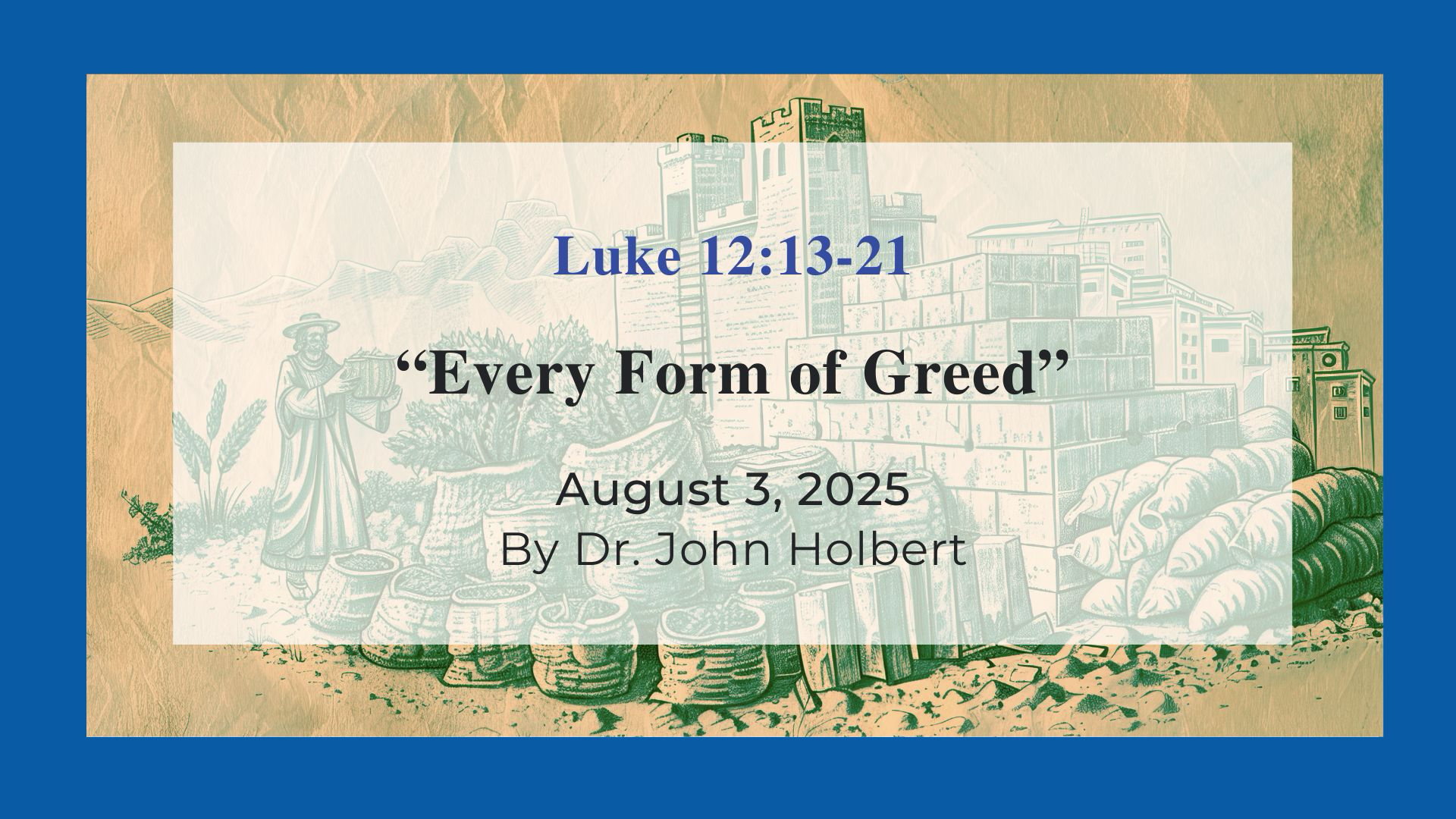Every Form of Greed - Reflections on Luke 12:13-21, Pentecost 8, Year C
by John C. Holbert on Monday, May 19, 2025

It has long been recognized that Luke is especially concerned with the use and misuse of possessions. Again and again, he explores the real dangers of wealth, how it controls the possessor rather more than the possessor having control over it. As James famously says it, “The love of money is the root of all evil,” and Luke would almost certainly agree. The tales of the prodigal brother, the dishonest manager, the rich man and Lazarus, the rich ruler, are just a few of the stories that dot Luke’s narrative and point over and again to the dangers of wealth. Here in Luke 12 we observe still another story that warns, this time with little subtlety, how those who imagine that they are safe and protected in their growing possessions are little more that fools.
Our context today is found in Luke 12:1 where crowds “gather by the thousands,” quite literally stepping on one another, listening to Jesus speak to his disciples. After warning them all against the “leaven of the Pharisees,” that is their hypocrisy, working within them as a cancer of sharp opposition to all Jesus says and does, just like the leaven works in the dough, silently, but inexorably, Jesus then teaches that God cares for them far more than any sparrow, even numbering the hairs on their heads! Their entire world is based squarely on the free gift of God, a gift they must strive always to recognize if they are ever to discover how they can live together in a community that values that gift.
During this important teaching, a voice speaks out of the crowd, and demands something of Jesus that seems at first completely beside the point of the master’s lesson. “Teacher! Tell my brother to divide the inheritance with me!” Jesus’s answer is blunt, and in no way responding to the man’s demand. “Man, who appointed me your judge or executor?” In effect, what Jesus says is: why ask such a question of me now, since the question reveals that what you really want is cash from the estate. That is why he next says, “Watch out! Protect yourself from every form of greed.” The Greek word used here is important: pleonexia, usually read “greed” or “avarice,” and names clearly that terrible vice that is always out to seek more possessions. It is regularly found in New Testament lists of vices to be avoided: Mark 7:22; Romans 1:29; Ephesians 4:19; 5:3. Colossians 3:5 calls pleonexia nothing less than idolatry.
And that insight leads Jesus to tell his famous tale of the man and his bigger barns. “The land of a certain rich man produced a good harvest. So he began to calculate (literally, “debated within himself”): ‘What shall I do? I do not have room to store my crops’”(Luke 12:16-17). During his inner calculations, he determines to tear down his inadequate barns and build bigger ones, in which he will “store all my grain and all my good things” (Luke 12:18). In effect, these barns are really gigantic safes, which can hold both grain and other “good things,” perhaps other signs of his increasing wealth. He then says to himself, “Self, you have many good things laid up for years to come. Relax, eat, drink, enjoy yourself!” (Luke 12:19) He imagines that he is now secure in a comfortable retirement, but God appears and calls him “fool,” just as a heart attack or some other mortal illness carries him off. And God adds, “These things you have prepared, whose will they be?” It turns out that the old saw, “you can’t take it with you,” is all too true for this unfortunate fool. Gathering riches, no matter how much, is never security enough for any mortal.
Jesus goes on to tell the disciples that they simply must not be anxious about their lives, what they will eat or wear, because if you look at the ravens, they do not harvest, or sow, and certainly have no storerooms. Still, God feeds them! You are worth more than birds, are you not? And besides, Luke is clear that birds die, and grass is alive today but tomorrow tossed into the oven; life cannot be defined only on the desire for more things—pleonexia cannot be allowed to govern any life!
What then are we to do? How we live now has a crucial impact on our futures, both as individuals and as a community. We must not romanticize the “birds of the air,” nor must we simply “not worry and be happy.” But the command to the rich man, who tries to ensure his eternal life by following rules, is told to “sell all you have and give to the poor, and you will have treasure in heaven.” Building bigger barns is the direct result of a person controlled by pleonexia, not by the certainty that all we have are gifts from God. If we cannot grasp that reality that Jesus has come to embody for us—that life is all gift—then we cannot ever share our gifts with others, thus beginning to create a beloved community based on gift. All greed of every kind finds its origin in pleonexia; all true joy arises from the recognition of the good gifts of a loving God.
